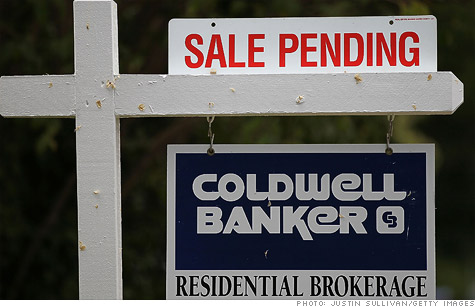
Mortgage rates are already at record lows, but that hasn't done much to boost lending. Can the Fed's Operation Twist really spur more borrowing?
NEW YORK (CNNMoney) -- The Federal Reserve wants consumers to apply for more mortgages and businesses to take out more loans, in order to boost the sluggish U.S. economy.
At least, that's the thinking behind Operation Twist, a policy announced by the Fed Wednesday that's meant to drive down long-term interest rates, thereby making it cheaper to borrow.
But will it really work? Industry experts have their reservations.
"Interest rates will come down, but the effect won't be what the Fed has envisioned," said Mike Fratantoni, vice president of research for the Mortgage Bankers Association.
One reason: Mortgage rates are already at record lows. While that helps some homeowners refinance their existing mortgages, it has done little to boost new home sales so far.
That's because credit standards are still tight, and even so, consumers don't want them.
"Low rates can only do so much," said Greg McBride, senior financial analyst with Bankrate.com. "Operation Twist will not prompt banks to make loans they're not comfortable making. It won't prompt people to buy houses if they're worried about a job loss, and it won't help homeowners refinance mortgages if they're already unable to qualify."
Even at record low rates around 4%, demand for new mortgages recently fell to a 15-year low, according to the Mortgage Bankers Association -- not surprising considering Main Street is still being hit by high unemployment.
Low rates have at least led to an inflow of applications for refinanced mortgages, which gives a slight boost to the economy. The Congressional Budget Office estimates that for each 1,000 homeowners who refinance, 38 fewer homeowners default.
But here's the catch: that option is only available to homeowners with pristine credit ratings and steady income, leaving out the roughly 22% of homeowners who are currently underwater in their mortgages, not to mention those struggling with unemployment.
"About a quarter of homeowners cannot even take advantage of what the Fed just did," said Frank Sorrentino, CEO of North Jersey Community Bank. "And the others who qualify for refinancing, probably already did so."
As for business loans, uncertainty about the economy continues to take its toll.
"Most corporations are already sitting on piles of cash," said Mike Schenk, vice president of economics for the Credit Union National Association. "And those that aren't, will find it difficult to sell internally the idea of investing more in an environment where demand just isn't there."
Experts also point out that Operation Twist could have the unintended consequence of hurting bank bottom lines.
Banks typically make money by taking in deposits at one rate, and lending out money at a higher rate. They take their profit from the difference between those two rates.
But if Operation Twist succeeds in lowering long-term rates, banks will have much narrower margins to work with. Long-dated loans are considered riskier, and if they offer low yields in return, why would a bank bother to lend?
"Our income is going to be under pressure as time goes on and it's going to be difficult to maintain the profitability that we had," Sorrentino said.
He points out that smaller banks don't have as many alternate lines of business to fall back on as the giant multinationals, like investment banking for example.
He expects Operation Twist will hit the small community banks hardest, forcing some to cut back on hiring or even lay off workers.
"Smaller banks especially are going to have a very difficult time making long-dated loans at these very low interest rates," he said. "The risk is just too much."�![]()
Source: http://rss.cnn.com/~r/rss/money_topstories/~3/xtLTwkL-dXo/index.htm
No comments:
Post a Comment